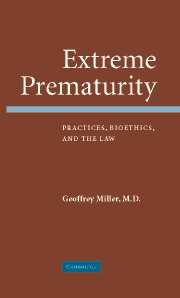Book contents
- Frontmatter
- Contents
- Part 1 THE EXTREMELY PRETERM INFANT: EPIDEMIOLOGY, PERCEPTIONS, AND PRACTICES
- Part 2 BIOETHICS
- Part 3 REPORTS, OFFICIAL OPINIONS, AND GUIDELINES
- Part 4 THE LAW
- 30 Introduction
- 31 U.S. Law
- 32 The United Kingdom
- 33 Canada
- 34 Australia
- 35 Japan
- 36 Italy, Germany, and Poland
- 37 France
- 38 The Netherlands
- Part 5 EPILOGUE: TRUTH, TRUST, AND BOUNDARIES
- References
- Index
35 - Japan
Published online by Cambridge University Press: 23 September 2009
- Frontmatter
- Contents
- Part 1 THE EXTREMELY PRETERM INFANT: EPIDEMIOLOGY, PERCEPTIONS, AND PRACTICES
- Part 2 BIOETHICS
- Part 3 REPORTS, OFFICIAL OPINIONS, AND GUIDELINES
- Part 4 THE LAW
- 30 Introduction
- 31 U.S. Law
- 32 The United Kingdom
- 33 Canada
- 34 Australia
- 35 Japan
- 36 Italy, Germany, and Poland
- 37 France
- 38 The Netherlands
- Part 5 EPILOGUE: TRUTH, TRUST, AND BOUNDARIES
- References
- Index
Summary
In Japan, the extremely preterm infant is protected by the Japanese Eugenic Protection Act, which defines the fetal viability limit as “the minimal duration of gestation which renders fetuses capable of extra uterine life(39) and was amended to 22 completed weeks in 1991. Therefore the expectation would be that such an extremely preterm infant would be given resuscitation after birth. How Japanese courts would respond to a request to allow withdrawal of life-sustaining treatment from an extremely preterm infant is uncertain, although this would be unlikely to occur for quality of life reasons alone. In general, Japanese physicians expect their directions to be followed,(379, 380) although the courts do recognize the right of competent adults to have their medical decisions respected.(381) If physicians decide that further treatment is not indicated, Article 35 of the Criminal Code offers a defense of justification for acts done “in the course of legitimate business.”(379, 382)
- Type
- Chapter
- Information
- Extreme PrematurityPractices, Bioethics and the Law, pp. 176Publisher: Cambridge University PressPrint publication year: 2006



